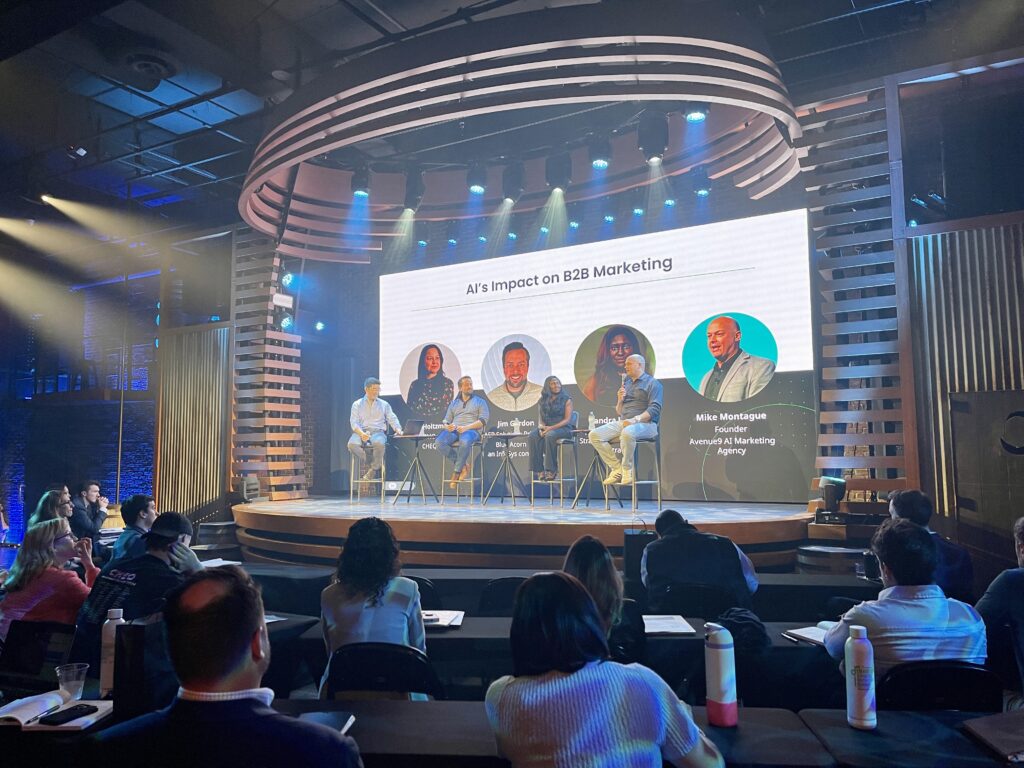
This week, I was honored to be asked to join the Summit sponsored by TechnologyAdvice.com, we explored the exciting potential and real-world challenges of integrating AI into marketing. From automation to content creation and predictive analytics, our conversations spanned practical applications, tools, and ethical considerations. Here’s a recap of our panel discussions, roundtables with top marketers, and actionable advice shared from the audience to leverage AI without losing the human touch.
1. Automation in Marketing: Building Efficiency Without Losing Quality
Automation can save time, streamline processes, and give marketing teams the freedom to focus on high-level strategy. Participants shared the tools that have been most effective for them:
- Meeting Transcription & Note-Taking: AI-powered tools like Otter, Copilot, and Fathom have been invaluable for capturing live conversations and summarizing key takeaways from meetings. These tools allow team members to stay engaged without getting bogged down in details, but review and editing are critical to ensure output quality and accuracy.
- Workflow Automation: We discussed automating mundane tasks like data analysis and using AI to keep campaigns fresh without sacrificing originality.
Key Takeaway: Automation is a powerful tool, but review and refinement are crucial. Use AI to streamline, not replace, human judgment, especially when finalizing customer-facing content.
2. Generative AI for Content Creation: Striking a Balance Between Volume and Originality
Content creation with generative AI tools like ChatGPT, HubSpot’s Content Hub, and Vidyo can produce significant amounts of material quickly. However, originality and brand voice remain paramount:
- Beyond the Basics: I highlighted how AI can generate content at scale but urged teams to keep a critical eye on quality. AI’s convenience should not come at the expense of nuanced, original messaging that resonates with your unique audience.
- Podcasting and Social Media Content: Vidyo, Podium, and Gamma were cited as effective tools for transforming long-form content, like podcast episodes, into summaries, blog posts, presentations, and social media snippets. These tools allow small teams to repurpose content efficiently while saving time and budget.
Key Takeaway: Use AI to amplify your message, not dilute it. A strategic blend of AI generation and human refinement ensures content that is both efficient and engaging.
3. Predictive Analytics and Machine Learning: Anticipating Customer Needs with Precision
Predictive analytics and machine learning hold transformative potential for marketers. AI can help anticipate customer needs, inform targeted campaigns, and drive more meaningful engagement.
- Customer Insights: From predictive modeling to personalized recommendation engines, marketers can use data to predict and respond to customer trends. However, success with predictive analytics hinges on having both the right data and the right people to interpret it.
- Website Traffic and SEO Insights: AI-driven content marketing strategies are already impacting website traffic, with companies leveraging analytics to track performance shifts and adapt SEO strategies accordingly. For example, one team saw a 57% increase in sales after implementing an AI-driven approach to content.
Key Takeaway: Predictive analytics and machine learning provide valuable foresight, but remember that quality data and skilled analysis are essential for actionable insights. The AI’s predictions must be contextualized and aligned with human understanding of your market.
4. The Human Element: Maintaining Intellectual Property and Brand Integrity
As AI advances, concerns around intellectual property (IP) protection and brand identity are front and center. Participants raised the importance of protecting original content and adapting strategies to prevent AI from diluting brand integrity.
- IP Protection Strategies: AI tools can easily replicate content, which raises questions about maintaining exclusivity and protecting brand assets. Companies should consider policies that regulate how and where AI-generated content is used to safeguard their IP and maintain brand trust.
- Navigating Ethical Concerns: AI can extend to deeper ethical questions. For example, AI-powered code generation and propagating biases sparked discussions on AI’s potential to automate traditionally human errors. Leaders should consider both the philosophical and practical implications of AI on their business values.
Key Takeaway: Intellectual property and ethical concerns aren’t just compliance issues—they’re about preserving what makes your brand unique. Building a thoughtful, human-first AI policy can help safeguard your brand while embracing AI’s benefits.
5. Adapting to New Customer Expectations: The AI-Enhanced Buyer Journey
Today’s consumers are increasingly educated and expect highly personalized experiences. As AI shapes search behaviors and content creation, it’s crucial for marketers to align their approach to meet these elevated expectations:
- Customer Education and Personalization: AI can help marketers track buyer journeys in real-time, offering insights into more educated customers who actively seek information before making decisions. Personalization is now table stakes, and brands must adapt quickly to stay relevant.
- Shifts in Search and Traffic Patterns: The rise of AI-driven search and content has impacted direct search engine traffic, which is down 50% for many websites this year. Companies must recalibrate their SEO and content strategies to cater to customers searching for deeper, high-quality information.
Key Takeaway: To keep pace with the evolving AI-influenced customer journey, prioritize quality and personalization. As AI reshapes customer expectations, human-first storytelling can be your differentiator.
Final Thoughts
AI is redefining marketing at an incredible pace. For marketers and SMBs ready to explore AI’s potential, it’s essential to balance the efficiency of automation with the authenticity of human connection. As we saw in these roundtables, AI has vast applications—from workflow automation and content generation to predictive insights and customer engagement—but it’s most effective with human oversight, creativity, and empathy. With a human-first approach, AI can enhance your marketing while staying true to your brand’s unique voice.
As we move forward, remember that AI should serve as an ally to human marketers, amplifying what we do best and making room for more meaningful work. If you’re considering incorporating AI, start small, stay vigilant about quality, and never lose sight of the people at the center of your strategy. After all, even in the age of AI, marketing is still about connecting with people.

